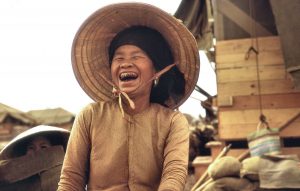Slang is a language that rolls up its sleeves, spits on its hands and goes to work. ~Carl Sandburg
From the earliest of times, military units have put together “invasion dictionaries” for the purpose of establishing communications with those they hoped to dominate. Way back when Caesar was stomping everyone into the ground, the Roman armies had “linguists” who facilitated the subjugation of those trodden under by providing language translations. This has been common practice with all military units since.
When I went to Vietnam, there was no such publication available, (at least not for lower ranking men of the enlisted nature) no Google Translate, and yes, it was occasionally (often?) difficult to interact with the Vietnamese, when necessary.
Many of the Vietnamese spoke pidgin English, which made them more astute than most Americans, who spoke little or no Vietnamese.
But we learned the important stuff real fast:
Beucoup; much
No Bic; don’t understand
Dinky dao; Crazy
Beucoup dinky dao; VERY crazy
Boom Boom; 😉
Numba one; you are great!
Numba ten; you stink
Caca dau; I kill you
Chelly boy; new guy
Cong Mou; Mosquito
Didi Mau; let’s get the hell outta here
Trau Dien; Crazy Buffalo
Ao Dai; traditional Vietnamese woman’s dress
Cong Khi; Monkey
Dung Lai; Halt
Khong hut thuoc; No smoking
La Vay; Beer
Moua; Rain
Nook; Water
Nuoc Mam; Fermented fish (beucoup fermented)
Mama San; Vietnamese woman
Papa San; Vietnamese man
Baby San; Vietnamese child
Same same; Same ol …
Tee tee; very little
Tu Dai; booby trap
I made an effort to learn Vietnamese, beyond the slang. A family member sent me a Vietnamese language book and I spent a few weeks studying it before trying it out on the locals.

After I felt I had enough mastery, I approached a few of the Mama Sans on base and started jabbering in Vietnamese. (My dialect) Normally talkative, all those present stood mute, staring at me like I was from the planet Mars. Not to be discouraged, I tried it out on a few of the Papa Sans, who were working nearby. A few of them were courteous enough to stifle their laughter, most did not.
Back to the drawing board, I hit the book for a few more weeks and tried again; with the same results, after which I tossed the book into our nightly bon-fire and put aside my visions of becoming the next ambassador to Vietnam.
I also did my best to master Korean, as I spent most of my last month in Vietnam with Korean soldiers of the Tiger Division. As with the Vietnamese language, I mastered enough Korean to stay fed, hydrated and mostly out of trouble.
좋은 하루 보내세요 (Have a good day) 😉
***
You are welcome to share this post as is, citing Joe as the creator. Copyright protected, all rights reserved © Joe Campolo Jr
Updated: February 13, 2024 at 4:44 pm
About the Author
Joe Campolo Jr.
Joe Campolo, Jr. is an award winning author, poet and public speaker. A Vietnam War Veteran, Joe writes and speaks about the war and many other topics. See the "Author Page" of this website for more information on Joe.
Guest writers on Joe's blogs will have a short bio with each article. Select blogs by category and enjoy the many other articles available here.
Joe's popular books are available thru Amazon, this website, and many other on-line book stores.

Joe, Once again, yer awesome! You brought back a ton of memories in a very short amount of words/time. Thanks…
Some of those times were fun…
Thanks Jim, glad you enjoyed the story.
Joe, you numbah one GI !! “33” beer on me! All kiddin’ aside, I sure can relate to this short short of your story. Somehow, I picked up the lingo in working with the ARVN at Phu Bai. I remember the 2nd Looey always looking to me to communicate with the Viets whenever they got on his nerves (that’s a story in itself). Beaucoup Dien Cai Dau for sure!
They were a hoot Steve, and so were the 2nd Looeys. LOL